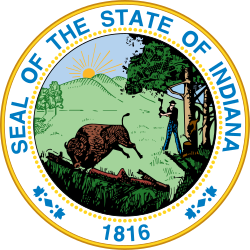Operating rules
The Indiana State Senate is operated according to a set of internal regulations developed and maintained largely by tradition. These rules are similar to the rules that govern the upper house most of the state senates in the United States. [4] The Senate convenes its annual session the first Tuesday following the first Monday of January every year. In odd numbered years the senate must meet for 61 days (not necessarily consecutive days), and must adjourn no later than April 30. This is typically called a long session. In even numbered years, when elections are held, the Senate must meet for 30 days (not necessarily consecutive days) and adjourn no later than March 15. This is typically called the short session. The only time the senate may convene outside of these dates is if the governor calls a special assembly. [5]
The senate must convene by 1:30 pm each day a session is scheduled. Two thirds of the senators must be present for the session to begin. Senators must be present at each session unless they are explicitly excused by the president-pro-tempore. Members who are not present can be forced to attend the session or be censured and expelled from the body. [5]
The lieutenant governor of Indiana serves as the president of the Senate and is responsible for ensuring that the senate rules are followed by its members. The president of the Senate takes no part in the debates of the senate and may only vote to break ties. The senate also elects a president-pro-tempore, a majority leader, and a minority leader. The president-pro-tempore is typically a senior member of majority party. The president-pro-tempore presides over the senate whenever the president of the Senate is not present. The president-pro-tempore is largely responsible for setting the agenda of the senate. [5]
When debate occurs in the senate, each senator is granted permission to speak on each issue once. A senator may not speak on an issue more than once without a permission from the rest of the senate, which is attained with a senate vote. A senator can speak for no longer than a half-hour at any one time and may be silenced by a majority vote at any time while speaking. [5]
Terms
Article 4 of the Constitution of Indiana places several limitation on the size and composition of the senate. [6]
- The senate can contain no more than 50 members.
- The term of a senator lasts four years with 25 senators being elected every two years.
- There is no limit to how many terms a senator may be elected.
Qualifications
Article 4 of the Constitution of Indiana states the qualifications to become a senator. [6]
- The candidate must be a United States citizen for a minimum of two years.
- The candidate be an inhabitant in the district for a minimum of one year.
- The candidate must at least 25 years of age when sworn into office.
- The candidate cannot hold any other public office in the state or federal government during a senate term.
This page is based on this
Wikipedia article Text is available under the
CC BY-SA 4.0 license; additional terms may apply.
Images, videos and audio are available under their respective licenses.




